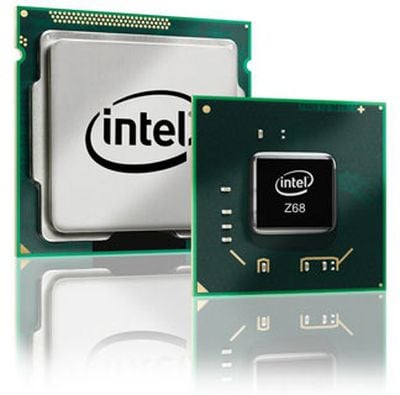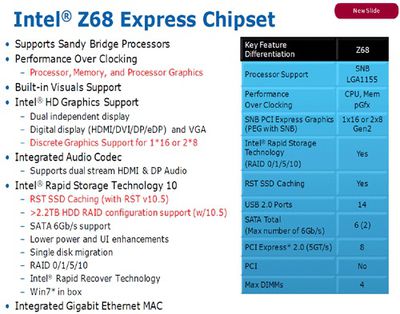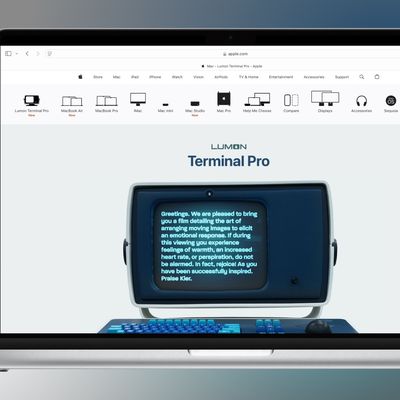Intel's Z68 Chipset to Bring SSD Caching to Sandy Bridge
VR-Zone reports (
via Hardmac) that Intel has begun production of its new "Z68" chipset for Sandy Bridge-based processors, with availability set for May. Most notably in light of rumors regarding the new MacBook Pro that failed to materialize, the Z68 chipset will support Intel's Rapid Storage Technology SSD caching.
Interestingly, Intel has also started production of their Z68 chipset this week along with other Cougar Point SKUs like H61 and Q65. All of them are based on the new B3 stepping therefore the SATA port 2-5 issue is fixed before they hit the market. Judging from the specs, it seems Intel has catered Z68 specially for enthusiasts which allows better processor overclocking, discrete graphics support and SSD caching capability.
SSD caching marries a conventional hard drive to a relatively small solid-state drive (SSD), with the most frequently-accessed data automatically placed on the SSD for fast access while the two drives appear to users simply as a single drive. The functionality serves to bring users much of the speed benefit of SSDs but with the storage capacity and lower cost of traditional hard drives.
Several rumors in the days leading up to last week's MacBook Pro refresh
claimed that the updated models would offer a dedicated SSD to host the operating system and other essential files. The claims did not, however, come to fruition.
Update: To be clear, the Z68 chipset is for desktop implementations.
Popular Stories
While the iPhone 17 Pro and iPhone 17 Pro Max are not expected to launch until September, there are already plenty of rumors about the devices.
Below, we recap key changes rumored for the iPhone 17 Pro models as of March 2025:
Aluminum frame: iPhone 17 Pro models are rumored to have an aluminum frame, whereas the iPhone 15 Pro and iPhone 16 Pro models have a titanium frame, and the iPhone ...
Apple is expected to release iOS 18.4 to the general public as soon as next week, following more than a month of beta testing.
Apple's website says some iOS 18.4 features will be released in "early April," so the update should be out as early as Tuesday, April 1.
Apple this week seeded the iOS 18.4 Release Candidate, which is typically the final beta version, barring the discovery of any...
Leaker Jon Prosser today shared a mockup of what he says the Messages app will look like in iOS 19, demoing an interface with rounded, translucent bubble-shaped navigation buttons at the top and softer, rounder corners for the keyboard and word suggestions.
Jon Prosser's Messages app mockup
The return button, a button for going back to the Messages list, and the FaceTime button have a deeper...
If you pay for iCloud storage on your iPhone, Apple has a new perk for you, at no additional cost.
The new perk is the ability to create invitations in the Apple Invites app for the iPhone, which launched in the App Store last month.
In the Apple Invites app, iCloud+ subscribers can create invitations for any occasion, such as birthday parties, graduations, baby showers, and more. Anyone ...
Apple today announced that AirPods Max with a USB-C port will be gaining support for lossless audio and ultra-low latency audio with a firmware update next month, alongside the release of iOS 18.4, iPadOS 18.4, and macOS 15.4.
For context, audio files are typically compressed to keep file sizes smaller. There are lossy compression standards like MP3 and AAC (Advanced Audio Codec), which...
Apple regularly refreshes the MacBook Pro models, and a new version that uses M5 series chips is in the works. Apple just finished refreshing most of the Mac lineup with M4 chips, and now it's time for the M5. Rumors suggest that we could see the first M5 MacBook Pro models this fall.
Design
There have been no rumors of a design update for the M5 MacBook Pro models that are coming this...
Apple is going all out with promotions for the popular Severance Apple TV+ show today, and as of right now, you'll find a new "Lumon Terminal Pro" listed on Apple's Mac site.
The Lumon Terminal Pro is designed to look similar to the machines that Severance employees like Mark S. and Helly R. use for macrodata refinement. The Terminal features a blue keyboard, a small display with wide...
The iOS 19 mockup images that leaker Jon Prosser shared today are not representative of the actual iOS 19 design, Bloomberg's Mark Gurman said on social media.
According to Gurman, the images that are "floating around" are based on "very old builds" or "vague descriptions," and are lacking key features. Gurman says that we can "expect more from Apple in June."
Gurman made the same comment ...
























